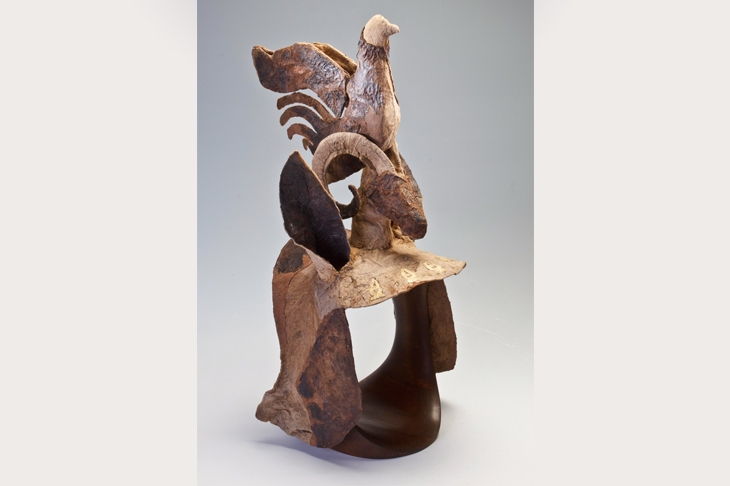You wouldn’t want to stumble upon the Scythians. Armed with battle-axes, bows and daggers, and covered in fearsome tattoos, the horse-mad nomads ranged the Russian steppe from around 900 to 200 BC, turning squirrels into fur coats and human teeth into earrings.
At their mightiest, they controlled territory from the Black Sea to the north border of China. They left behind no written record, only enormous burial mounds, chiefly in the Altai mountains and plains of southern Siberia. Chambers that weren’t looted in antiquity were preserved in the permafrost only to be discovered millennia later. It is thanks to Peter the Great and the expeditions he launched that so many objects have now been retrieved from the ice.
There are hats for horses topped with felt cockerels, lumps of cheese kept in pretty pouches, a stick-on beard dyed chestnut brown. Scythians: warriors of ancient Siberia is unlikely to leave you pondering how little humans have changed.
Herodotus said that the Scythians were cleverer than their Black Sea neighbours. They did their best work in gold, punching and pummelling appliqués from flat sheets and moulding huge belt buckles into shapes of animals in combat. A vulture tramples a tiger to maul a yak. A tiger chews the hind leg of a panther-wolf-bird hybrid. Scythian men wore their buckles over sheepskin coats and leather trousers. Some tribes completed the ensemble with tall pointy hats.
The Scythians were racially diverse. Several women buried in mounds at Pazyryk, near the modern Chinese/Mongolian border, look European, while the chiefs have Mongol features. Standing face to face with one of these heavily tattooed, mummified, injured warriors is as unsettling as it sounds. Was it the third blow of the battle-axe to his skull that killed him, or the thrust of the sword to his brow? At least he was dead by the time he was scalped and relieved of his brain.
Herodotus said that the Scythians scalped their enemies, too, attaching the remains to their horses’ bridles. They embalmed their own dead, stuffing them with straw, pine needles, herbs and larch cones from the Siberian forests. The remains were placed in coffins made from whole trees and interred in felt-lined chambers. When a chief died, says Herodotus, his horses were killed and his cupbearer, cook, groom, squire, messenger, and one of his concubines strangled and buried with him. The mounds at Pazyryk contained dozens of horses and enough saddles, bridles and bits to keep them going in the afterlife.
One of the most beautiful objects in the exhibition is a small saddlecloth decoration of a winged bull. Discovered in northern Kazakhstan, it was embroidered from wool with a delicacy one wouldn’t expect from a people so enamoured of triple-blade arrowheads. It was delicacy, though, that the Scythians used to define themselves. Pass the cases of terrifying war implements, and you come to a copy of a felt tomb hanging featuring men with neat bobbly haircuts and cheerful moustaches riding horses. They look almost cute. Although the human remains suggest the Scythians were clean-shaven, the Greeks and Persians characterised them with beards. Perhaps they aspired to grow facial hair (no one really knows what the false beard was for).
Their women, after all, were trouser-wearing, horse-riding warriors — Amazons, according to Herodotus. In his Histories, the Amazons sleep with the Scythian men but refuse to cohabit with the existing Scythian women because they are not outdoorsy enough. The Amazons therefore set off with their Scythians to establish a new people. With their peculiar wooden hats — topped with tall plaits of hair — and weaponry, the women of Scythia must have looked terrifying to the Greeks. It’s now thought that they really did inspire the Amazon myths.
It would have been nice to see something of the Amazons in this otherwise exhilarating exhibition. One senses a slight tentativeness on the part of the curators to draw too much from Herodotus, even though the evidence from the mounds corroborates so much of his colourful account. He said the Scythians would ‘howl in wonder’ as they inhaled cannabis. A brazier with burned hemp seeds is on display. He described stages in their burial practices that the archaeology confirms. The Scythians were much as he described them: formidable horsemen, horsewomen and warriors with a taste for fine craftsmanship; they worked gold as if it fell ‘from the sky’.






Comments